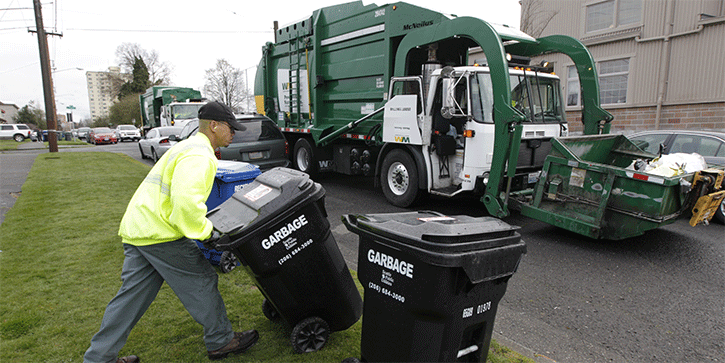
Why Garbage Is Good Business… And Other Things Income Investors Should Know
- Robert Ross
- |
- The Weekly Profit
- |
- May 22, 2019
Hi everyone,
It’s Ed D’Agostino, publisher of Mauldin Economics.
This issue of The Weekly Profit is going to be a little different.
Today I’m sitting down with your editor and Mauldin Economics’ senior equity analyst, Robert Ross, to talk about income investing—which he calls the “unicorn of investing strategies.”
Robert and I spent a lot of time discussing it in Dallas last week. And I thought you’d benefit from his insights.
We’ll also hit on his proprietary stock evaluation system, why the defense industry is one of his favorites, and his biggest concern about the stock market right now.
Let’s get to it.
|
Ed: Robert, you’ve been our senior equity analyst for years. But your real passion is income investing. How did that develop?
Robert: Well Ed, after watching what happened to various family members during the global financial crisis, I turned my focus entirely to income investing.
I dedicated almost every working hour to figuring out how to help them and other ordinary investors avoid common investment traps.
The process made me more risk averse, which led to income investing.
Ed: That makes sense. But you were already honing your income investing chops before the global financial crisis, right?
Robert: That’s right. Even before 2008, I was doing research for a former colleague on the relationship between interest rates, inflation, and dividend investing.
The takeaway: You can create long-term wealth by holding safe and stable dividend-paying stocks. I found so much data to back this up.
For instance, I’m sure our readers know about a group of stocks called the Dividend Aristocrats.
These companies have increased their dividends for at least 25 years in a row. They’re basically the best of the best dividend-paying stocks.
Dividend Aristocrats handed investors an average annualized return of 10.3% from 2005 to 2015, a period that includes the global financial crisis.
That’s quite a bit better than the 7.3% from the S&P 500 during the same period.
And it came with less volatility. The average volatility for Dividend Aristocrats was 13.9%, versus 15.1% for the S&P 500.
Higher returns with less risk is the unicorn of investing strategies. And income investing is the only way I know that individual investors—meaning folks without access to Wall Street’s supercomputers—can achieve that.
Ed: Interesting. You got to apply these concepts early on when you joined Mauldin Economics. Can you tell our readers about that?
Robert: In hindsight, Mauldin Economics was the perfect fit.
I’ve worked on income-focused letters since I joined the company in 2012. Initially, I collaborated with former editors Grant Williams and Patrick Watson. This pushed my income investing skills to a new level.
And now, of course, I’m the editor of our income-focused letter Yield Shark.
But my approach goes beyond traditional income investing.
For instance, when I have a big idea, I go to the source. This includes traveling to meet with hedge fund managers in Zurich. And touring the largest cannabis farm in Colombia.
Even as we talk today, I’m in Mexico City meeting with business owners to see how Mexico is benefitting from the trade war with China.
I also combine traditional strategies like evaluating dividend safety with Warren Buffett’s concept of an “economic moat.”
Ed: Can you explain what an economic moat is?
Robert: When a company has an economic moat, it means it’s extremely difficult for other companies to break into their business.
You can think of it as a literal moat around the company.
For example, economic moats feature high barriers to entry. That’s where the costs to enter the business are so high that few, if any, new companies can afford to try.
Companies in the military defense industry—one of my favorite sectors—often have extremely high barriers to entry. It’s next to impossible for new companies to secure complex government defense contracts.
Another feature of an economic moat is a network effect. My favorite example here is the telephone. A telephone is not very useful if only two people have one. But it grows in value as more people use them.
This applies to a company like Facebook, too. It becomes more valuable as more people use it.
Companies with economic moat features often have much more stable business models. This makes them perfect for income investing, where safety and stability are key.
Ed: And many of the stocks you recommend in Yield Shark and In the Money benefit from economic moats.
Robert: Definitely. One of our In the Money stocks is a trash removal company called Waste Management (WM).
It’s the poster child for economic moat.
The waste removal business benefits from high barriers to entry. Breaking into the business means securing long-term government-granted contracts, some of which run as long as 125 years!
Some people might think trash is boring. And maybe they’re right. But from an investing standpoint, there’s nothing more consistent than trash removal.
This means a company like Waste Management will do well no matter what’s happening in the economy.
We saw this late last year when most stocks were in a freefall, but Waste Management shares actually increased.
Since I recommended the company back in 2018, shares are up around 30% while earning a solid 2.0% dividend yield. Meanwhile, the S&P 500 is only up 3% or so.
Waste Management is exactly the type of business you want to own right now.
Ed: What are some of the other ways you help your readers gain an edge?
Robert: My use of quantitative models really helps.
As you know, I created two key models that I use in my publications: the Equity Evaluation System (EES) and the Dividend Sustainability Index (DSI).
The EES uses over 75 criteria to find the best investment opportunities in US stocks. The system keeps us away from the “dogs.”
It works by creating an objective score for each company in a given industry based on fundamental, valuation, technical, and qualitative factors, like economic moat.
Once I have an EES score for each company in a sector, I can see which one has the best mix of the criteria I just mentioned.
Ed: And what about the DSI?
Robert: I use the DSI exclusively for income investing. It looks at a basket of key metrics to evaluate a dividend’s safety, meaning the likelihood that the company will cut it. This includes everything from the payout ratio to free cash flow growth.
Just like the EES, each data point is assigned a score in the DSI. This helps to objectively measure a dividend’s safety.
Of course, every stock in the Yield Shark and In the Money portfolios has the highest EES and DSI scores. That’s one of the main reasons my portfolios have performed so well over the years.
For In the Money, we use a simple option selling strategy to earn income and acquire companies we want to own. We’ve had a 94% success rate with this strategy since we started back in 2016.
And for Yield Shark, our open positions have an average return of 9.5%. Considering these are all safe stocks, that’s a solid return. And, when you factor in an average dividend yield of 4.2%, it’s churning out pretty steady income as well.
Ed: Let’s switch gears here. Analysts like you often have their ear to the ground on financial bubbles. Government debt is the obvious one, but is there anything else you’re worried about?
Robert: My biggest concern is that the Federal Reserve and US government are using all their monetary and fiscal “bullets” at the wrong time in the market cycle.
Typically, when unemployment and inflation are low, markets are at all-time highs, and the economy is strong, you want to raise interest rates. That way, when the economy inevitably hits the skids, you can lower interest rates to spur economic activity.
The Fed raised interest rates somewhat from December 2015 to December 2018. But rates are still below their long-term average. And real interest rates, meaning the nominal rate minus inflation, are barely above 0%.
So our monetary policy situation is less than ideal.
Ed: What about the fiscal side of the ledger?
Robert: Well, that’s the problem.
Congress passed a major tax cut last year, which is another measure you would take to spur growth when the economy is struggling… not when corporate earnings and the stock market are at all-time highs.
To add insult to injury, Congress is now toying with the idea of a $2-trillion infrastructure package. This is yet another measure responsible public servants would save for a slowing economy.
With no bullets left to spur growth, I imagine the next downturn will be deep. But with so much stimulus, I don’t expect it to happen tomorrow.
Ed: So these are pretty crucial times for any investor. What piece of advice would you give readers?
Robert: We’re in uncharted territory. Even in normal periods, I think investors take on too much risk.
And right now, we’re definitely not in a normal period. We’re in the midst of the longest bull market in US history. Eventually the music will stop and the markets will correct. They always do.
Investors got a taste of this at the end of 2018. The S&P 500 fell as much as 20% in a three-month period.
Meanwhile, the Yield Shark and In the Money portfolios performed really well—which is what they’re designed to do during rough patches. I don’t want to give away too many stocks, but a manufactured home business called Sun Communities (SUI) crushed the S&P 500 during this period.
The S&P 500 is down 1.6% since the markets started selling off in October 2018. Sun Communities, on the other hand, is up 23.5%. And it pays a 2.4% dividend yield.
I’m always looking for companies that perform well no matter what’s happening in the economy. Sun Communities, Waste Management, and our other holdings speak to that.
The sell-off in late 2018 tested my combination of income investing, quantitative modeling, and boots-on-the-ground research against a small crisis. All I can say is, I was extremely pleased with the results.
My readers tell me they’re more than pleased as well.
Ed: Robert, this has been great. Thanks for taking the time to speak with me today.
Robert: My pleasure, Ed.

Robert Ross

